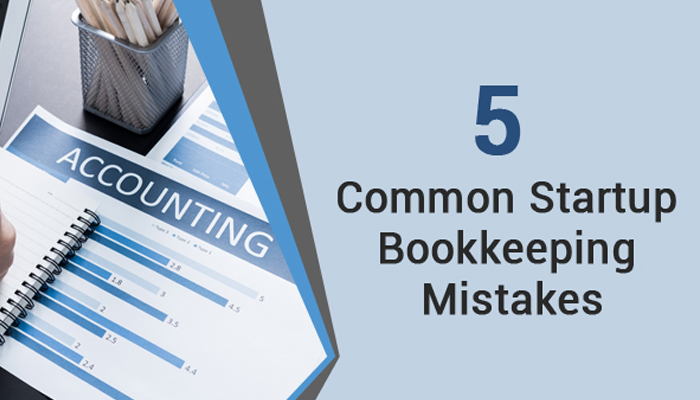
1000+
customers

50+ countries
across the world

Outsourcing leader
since 2008

Technology-driven
services

Stringent
quality processes
5 Common Bookkeeping Mistakes that Startups Usually Make
Last updated: 02 Feb, 2024 By Harinder Pal Singh | 6 Minutes Read

The majority of business owners have no difficulty trying to think up big ideas for the best way to start off a new business and avoid bookkeeping mistakes. Apart from this creative spirit, research has shown that almost 90% of all startups fail within the very first 5 years.
For a lot of those business owners, their dilemma is not their ideas or perhaps the products or solutions they provide. Rather, all of it comes down to the way they manage their finances. All things considered, without a steady financial grip, even the perfect businesses will quickly hit upon their downfall.
Bookkeeping Mistakes that Businesses Do
Blur the Line between Individual and Business Finances
A lot of business owners make the error of mixing up their individual and business finances. Whenever commencing a business, these kinds of minute infractions would possibly not appear to be crucial, however as your business expands, this blurred line between your individual and business finances might end up being an actual problem. It is critical that you set up different accounts from the beginning of your business and by no means cross that line.
Lax Accounting Procedures
The majority of business owners are going to acknowledge that they are not skilled accountants. However, these same business owners make an attempt to manage their finances in house. This high priced mistake causes startup founders to concentrate their thought on things such as payroll and bank account reconciliation as opposed to exclusively concentrating on the right way to expand their business.
A bookkeeping outsourcing service provider will make sure your records are updated, record transactions correctly, and maintain a record of your accounts receivable and payable.
Declaring Revenue before Actual Delivery
Declaring your revenue at the time you make a sale often is a risky approach to follow. It makes your books appear better — at least initially — however it does minimal to demonstrate accurate profits. The difficulty with keeping track of your revenue far too early is the fact that you neglect the expenditures that go into the final delivery. Regardless of whether you are merchandising products or perhaps offering services, you should think about your expenditures before you can establish your actual profit.
Laxity of Capital Expenses
You have most likely caught wind of a lot of startups that have an excellent year, simply to be compelled to shut down the following year or so. Where did these kind of prosperous entrepreneurs go amiss? One error a number of business owners make after an excellent year is the fact that they go on a spending spree with funds from their income. This strategy is particularly risky when buying high-value products that can depreciate as time passes.
Restricted Financial Analysis
Creating a comprehensive budget is a typical practice for almost any business owner beginning a fresh endeavor. Nevertheless, a number of startup owners are not able to consistently evaluate the standing of their business. This restricts their capability to adjust their budget as the business expands or to identify possible issues looming in the backdrop. One of the best advantages of making use of outsourced bookkeeping services is that they are able to present you with updated reports that enable you to evaluate the financial status of your company.
Staying away from these kinds of typical financial mistakes can cut off your risk of turning out to be a part of the 90%. We at Cogneesol can help you in staying away from these typical accounting mistakes. Get in touch with us to understand how we can help you with managing your books. Our number is +1 646-688-2821 and the email address is [email protected]
Read Also: 6 Qualities Which a Bookkeeper Must Possess
Latest Blogs

This site is protected by reCAPTCHA. Google's Privacy Policy
and Terms of Service apply.








